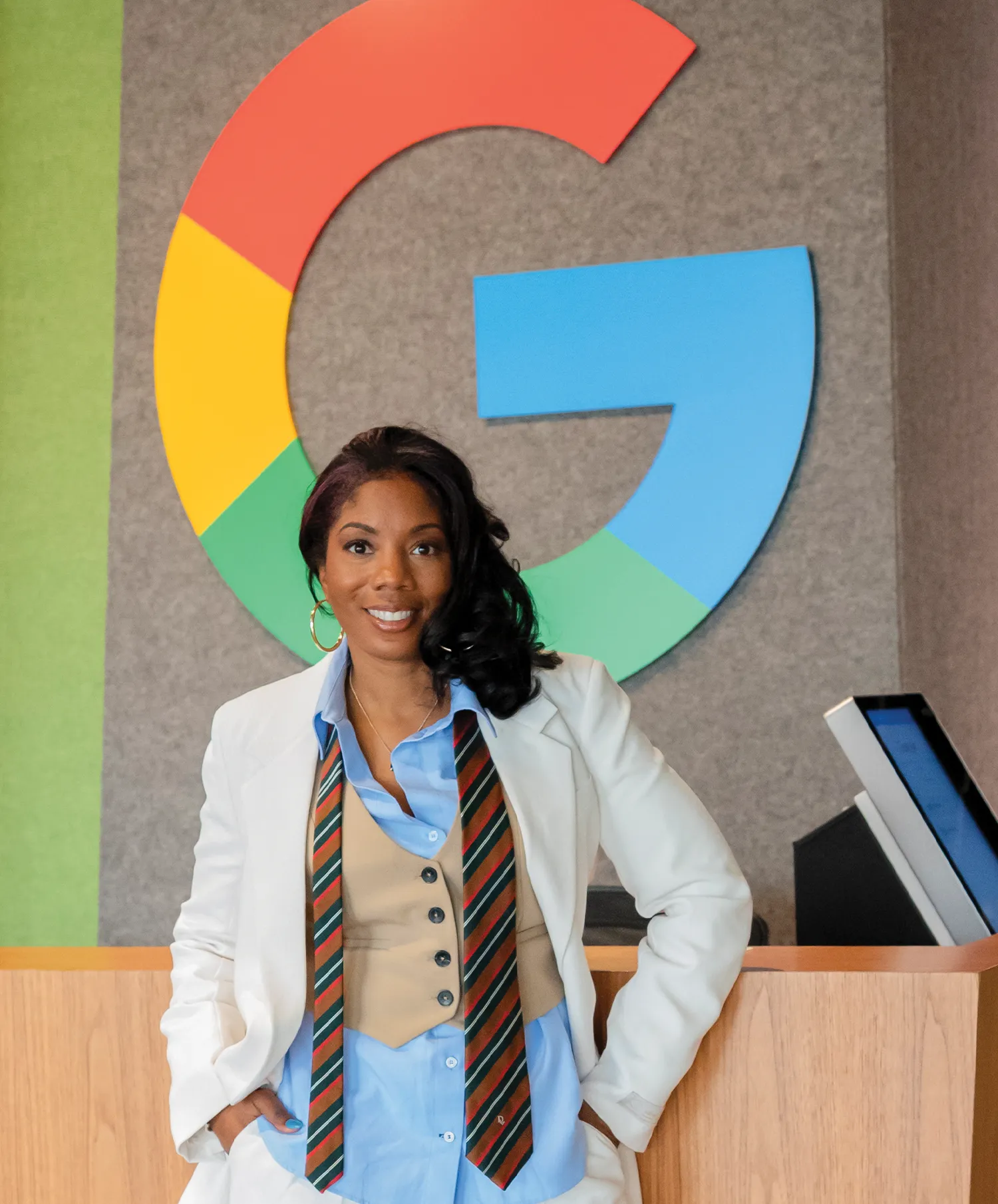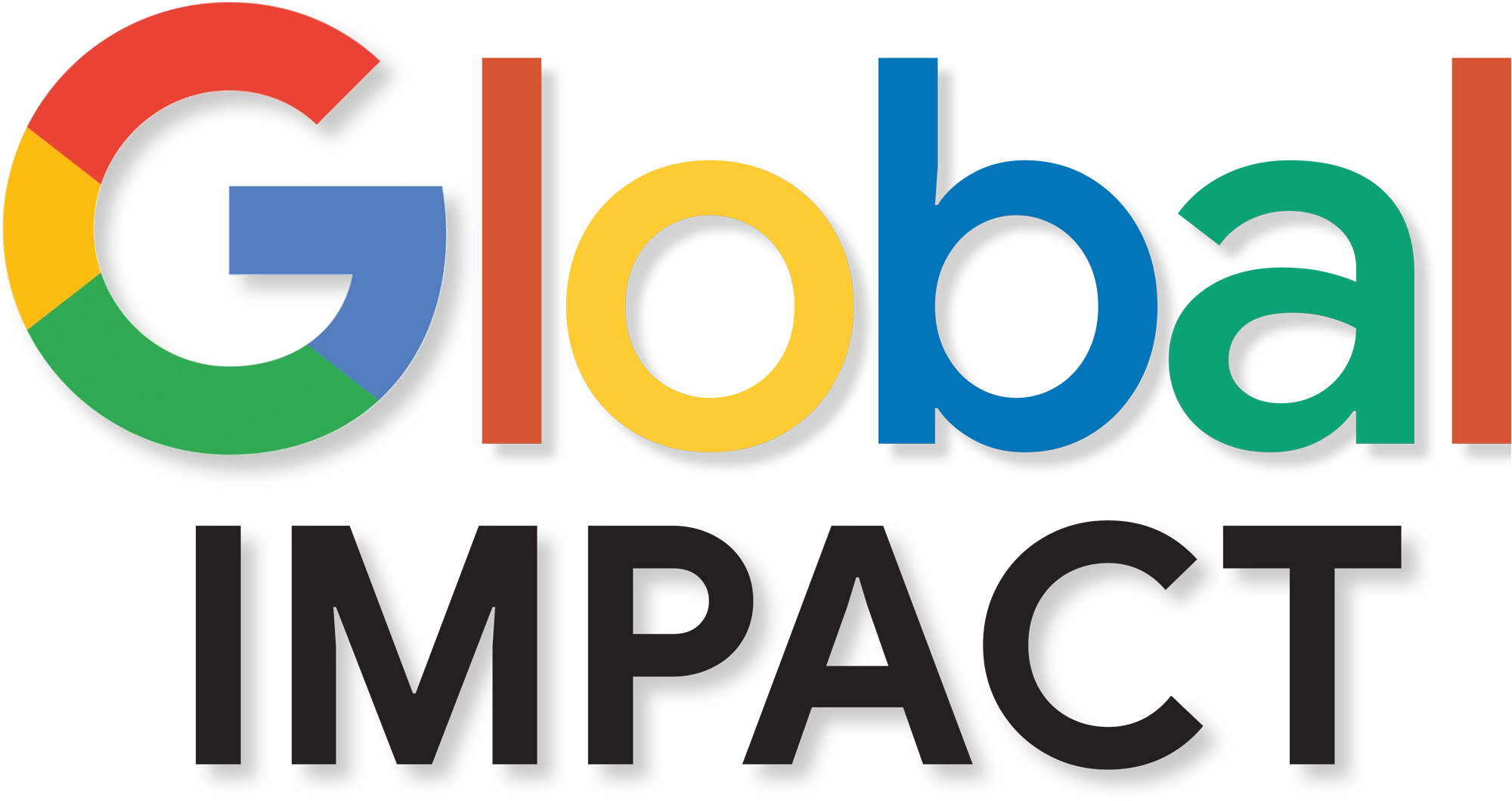
The head of global marketing efforts for developer communities at Google, Rachelle Olden ’04 is using technology, community and inclusivity to create space for something better.
Global Impact


by Alicia Lutz
All her life, Rachelle Olden ’04 has been bringing communities together so that all voices are heard,
all perspectives are included. Now an advocate for building technology that reflects and serves everyone, Olden has made some significant moves in the industry. And it’s been quite the ride.
Going Places
Olden dragged her younger sister into the newsstand at the Columbia, S.C., airport. They were on their way to the AfroTech conference in Austin, Texas – Olden for work, her sister for fun. But the highlight of the trip for both sisters was flipping through Essence magazine and finding Rachelle’s face smiling among the pages.
“To be recognized by a magazine I grew up reading – that my mother and aunties read – was deeply meaningful,” says Olden, a senior global marketing manager at Google, who was selected for the magazine’s 2023 Power 40 list of the most influential Black professionals shaping business and culture. “To be recognized for my work and my contribution in the tech space in Essence magazine was a moment of pure joy.”
Indeed, ever since her days growing up in Brooklyn, N.Y., and Columbia, S.C., Olden had dreamt of being in the publication.

What other company is a verb – and is used by billions of people every day? And what workplace has a music room, game room, nap room, gym, doctor’s office, massage studio, hair salon, jellyfish meditation lounge and free food on every floor?
“One of the special things about working at Google is definitely the offices,” laughs Olden, who is based in Seattle. “It’s a huge privilege to work for a global company that is really impacting how we live.”
Olden joined Google in 2022 to lead the multinational tech corporation’s Tech Equity Collective – an initiative she shaped to accelerate advancement in tech – and now leads global marketing efforts for developer communities.
“There are approximately 30 million developers in the world, and it is my job to bring them into our communities,” she says, adding that she is currently building an AI skills program for next-generation developers. “My work is about building community, amplifying impact and making sure people from all backgrounds and perspectives feel equipped and inspired to lead in tech.”
Another great thing about working for Google is the company’s emphasis on work-life balance, something that Olden appreciates. It gives her time to serve on the Seattle City Council Community Involvement Commission, which helps the Seattle community be more civically engaged; instruct yoga for unhoused families; be involved in the city’s arts scene; spend time with her Maltipoo, Snowii; enjoy scenic hikes; visit family in South Carolina regularly; and just appreciate the thriving city of Seattle.
“I love the life I’ve built here,” says Olden, who lives in Seattle’s Belltown neighborhood. “I’ve built a pretty good community for myself.”
She’s built a pretty good community for others as well: In 2021, she started AfroCamp, a retreat for adults to reconnect, laugh, rest and build meaningful community.
“I wanted to create a space that was joyful, healing and inviting,” says Olden, adding that in its first year, AfroCamp had 150 campers. “Imagine adults playing tug-of-war and doing arts and crafts and singing camp songs – it’s meant to be cheesy, but it’s also about intentionally giving people the opportunity to connect with each other and truly be seen. It’s a place where everyone is included.”
And Olden is all about inclusivity. She was named a 2025 global leader with the Abundance Women’s Ascend Program, which recognizes women leaders making significant contributions in technology and emphasizes the importance of diverse voices in shaping the future of technology.
“I think it’s important to see everyone in technology because technology impacts every facet of our lives, whether it’s the phone in your hand or the streaming service you use or the car that you drive,” says Olden. “All of us are interacting with technology, and for technology to be effective and to have impact, everyone needs to be part of building it, shaping it, not just using it. I think it’s instrumental that you’re bringing different lived experiences and voices together so that you can build something that actually works for everyone.”
She points to health studies where there’s a whole population left out: Those health studies can’t have real impact if they exclude an entire demographic.
“You can’t say you’re solving a problem for the world, but you’re only solving it for 50% or 25% of the world, right? You’re not really solving a problem,” says Olden, who was recently honored as one of Puget Sound Business Journal ’s 40 Under 40. “When entire communities are left out of the design, development or deployment of new technologies, the impact can be harmful. If you’re going to build technology for the world, you need to have people from the world at the table building that technology. Inclusion isn’t charity; it’s strategy.”
Finding the Space
Coming to the College of Charleston was a strategic move for Olden. And – despite regularly getting parking boots on her Nissan Altima during those days – she never stopped moving once she got there.
“I saw the College as a place where I could shape my identity, grow as a leader and build something meaningful,” says the first-generation student, who started college at age 16. “The College of Charleston was a place that I felt like I could be myself, that I could become a leader, that I could have all of the experiences that I wanted.”
That experience started with the SPECTRA (Speedy Consolidation and Transition) program, a summer bridge initiative designed to prepare students for college life.

Olden knows the value of belonging, of connecting, of community. As the oldest of five siblings, she also knew how to hold space for others while trusting her own voice as a leader. She grew up in a modest single-parent home where love, resourcefulness and resilience were fundamental.
“We didn’t have a lot, but I had everything I needed to believe in myself,” says Olden, adding that her upbringing taught her to advocate, collaborate and see beyond her immediate circumstances. “That foundation taught me how to be audacious, stay grounded and dream without limits.”
Her parents, grandparents, aunts and uncle were key in providing a supportive community.
“They gave me room to be the most unique version of myself,” she says. “They encouraged deep thinking, curiosity and confidence.” It shaped how she walked through her years at the College, too – motivating her to seek out every possible opportunity to learn, lead and connect. She worked at the Avery Research Center for African American History and Culture and in the Department of Hispanic Studies; interned with Spoleto Festival USA twice; wrote for the George Street Observer; hosted a radio show; and served as president of the Public Relations Student Society of America, vice president of the Black Student Union, a student government senator and senior class president.
“I maximized every experience that I could,” says the communication and Spanish double major. “A lot of who I am today started at the College. I built a character of service to others.”
Part of that public service was with Aya Hwe M’, the women’s empowerment organization she founded on campus.
“With Aya Hwe M’, we created a space that brought together women from campus and the surrounding Charleston community,” she says, noting that the group worked closely with the Florence Crittenton Programs of South Carolina, a support services agency with a mission of providing hope, safety and opportunity for disadvantaged pregnant young women and parenting mothers. “I noticed the contrast between our daily lives on campus and the lives of women just a few blocks away. We were in this bubble – focused on classes and campus life – while others were navigating very different challenges. I wanted to build bridges. I felt that it is my role to make space, speak up, advocate, challenge the status quo and expose others to opportunities to pursue their wildest dreams and contribute to their communities as well.”
That’s exactly what she did when she joined the Peace Corps upon graduation.
She’d first learned about the Peace Corps while she was studying abroad in Santiago, Chile – something that she was encouraged to do by her supervisor in the Hispanic studies department, the late Marti Norfleet.
“She was more than a mentor,” Olden recalls of the administrative assistant. “She was a bright light in my journey.”
As the impetus for Olden’s study abroad in Chile, Norfleet had a direct impact on that journey: During that trip, she met a Peace Corps volunteer.
“I remember running to an internet café after meeting him and googling the Peace Corps, and immediately I was like, ‘I’m doing this after school,’” she says. “I like to say that it was all interconnected. If I didn’t get the work-study in the Department of Hispanic Studies, then I wouldn’t have been encouraged to go boldly overseas, and then I wouldn’t have met the person who actually served in the Peace Corps, and then I wouldn’t have applied to the Peace Corps later.”
Olden’s Peace Corps service from 2004 to 2006 was in the Dominican Republic, where she worked with a youth development organization. After her two years there and an internship at the Clinton Foundation in New York City, she took a position with the UN World Food Programme in Liberia, supporting its ministry of education in launching parent-teacher associations for two years. From there, she spent a year in El Salvador and a year in Costa Rica leading local-level advocacy programs with World Vision International.
“Those years abroad were formative,” says Olden. “They deepened my understanding of systemic barriers, but also showed me the power of local leadership and collective action.”
These early experiences taught her how to move between different communities, advocate for others and lead with clarity and compassion. They also solidified a love for travel that would take her to 55 countries – and counting.
When she returned to the States from Costa Rica, Olden knew it was time to start thinking about going back to school.
“I wanted a degree that was going to be able to cross over into any industry,” says Olden, who was debating whether to study public administration or business. “It’s easier to take a business degree into public administration or policy than the other way around, so I decided that I was going to have more bang for my buck and more diversity of options by going to business school.”
She knew her next move.
Steering in the Right Direction
“I had already quit my job because I just knew I was going to business school,” says Olden, who had completed Management Leadership for Tomorrow, a program with a 99% success rate of getting high-potential professionals into top MBA programs. “It was humbling.”
With no job, no school and no plan, Olden chose to spend a month in the coastal town of Hua Hin. But 30 minutes into the bus ride, she started second-guessing the decision. She got off the bus, hailed a taxi back to the airport and waited 12 hours for the next flight home.
“I just sat there asking myself, ‘What do I do now?’”
Eventually, she canceled her flight again, got back on the bus to Hua Hin and stayed for the next nine months, studying for and retaking the GMAT, taking online calculus and accounting courses, volunteering at an elephant sanctuary, reading and reflecting.
“It ended up being one of the most grounding and important seasons of my life,” she says. “I learned that failure wasn’t the end – it was the beginning of a new path.”
And when it was time to start that new path back home, she reapplied to Duke University’s Fuqua School of Business and was accepted on a full scholarship. Then she reached out to Sheryl Sandberg, former COO of Facebook, and landed a role at Sandberg’s nonprofit supporting women’s ambitions, LeanIn.org, to fill the time before business school began.
Working for Sandberg, a successful woman in the tech field, encouraged the appeal of taking that route as well.
“I wanted to work in an industry that is making an impact on the way we live our lives and interact with our lives, and so technology just made sense,” says Olden. “It didn’t hurt that it was a fast-growing, high-paying industry.”
After earning her MBA at Duke in 2018, she headed to Seattle to work at Microsoft – first as a product marketing manager and then as a global industry partnerships and engagements manager – before joining Google in 2022 to lead its Tech Equity Collective and increase Black innovation in the tech industry.
“If we’re going to build good technology, I want to make sure that people understand what it is, how to use it and how to build with it to impact their lives,” says Olden. “I wanted to sit at that intersection in product marketing, where I get to work with those who are building it and those who benefit from it. I want to be a part of that story, a part of that narrative.”
Now, of course, she’s not just a part of that narrative – she’s taken a leading role that impacts where, exactly, the story goes.
“I’ve never been afraid to take the scenic route,” says Olden. “Every setback has taught me something. Every pivot has created space for something better.”
Creating spaces for something better is exactly what she wants to do.
“I want to build bold programs, stories and communities that help people transform their potential into power,” says Olden, who also advises tech and policy leaders on inclusive design and frequently speaks at conferences. “Whether it’s through tech, storytelling or shared experiences, I’m here to do work that matters.”